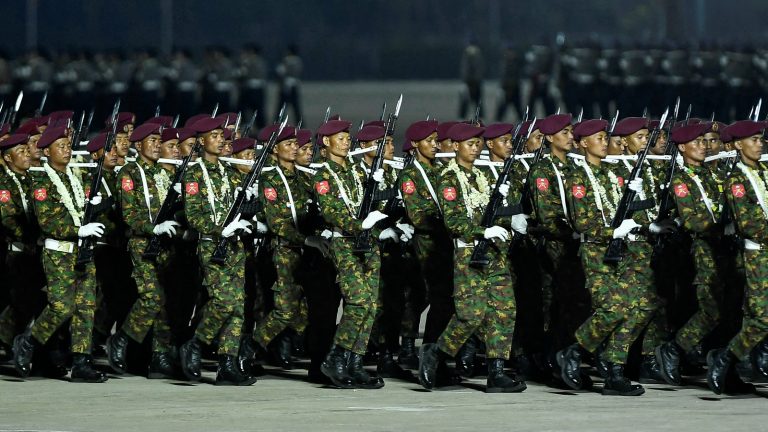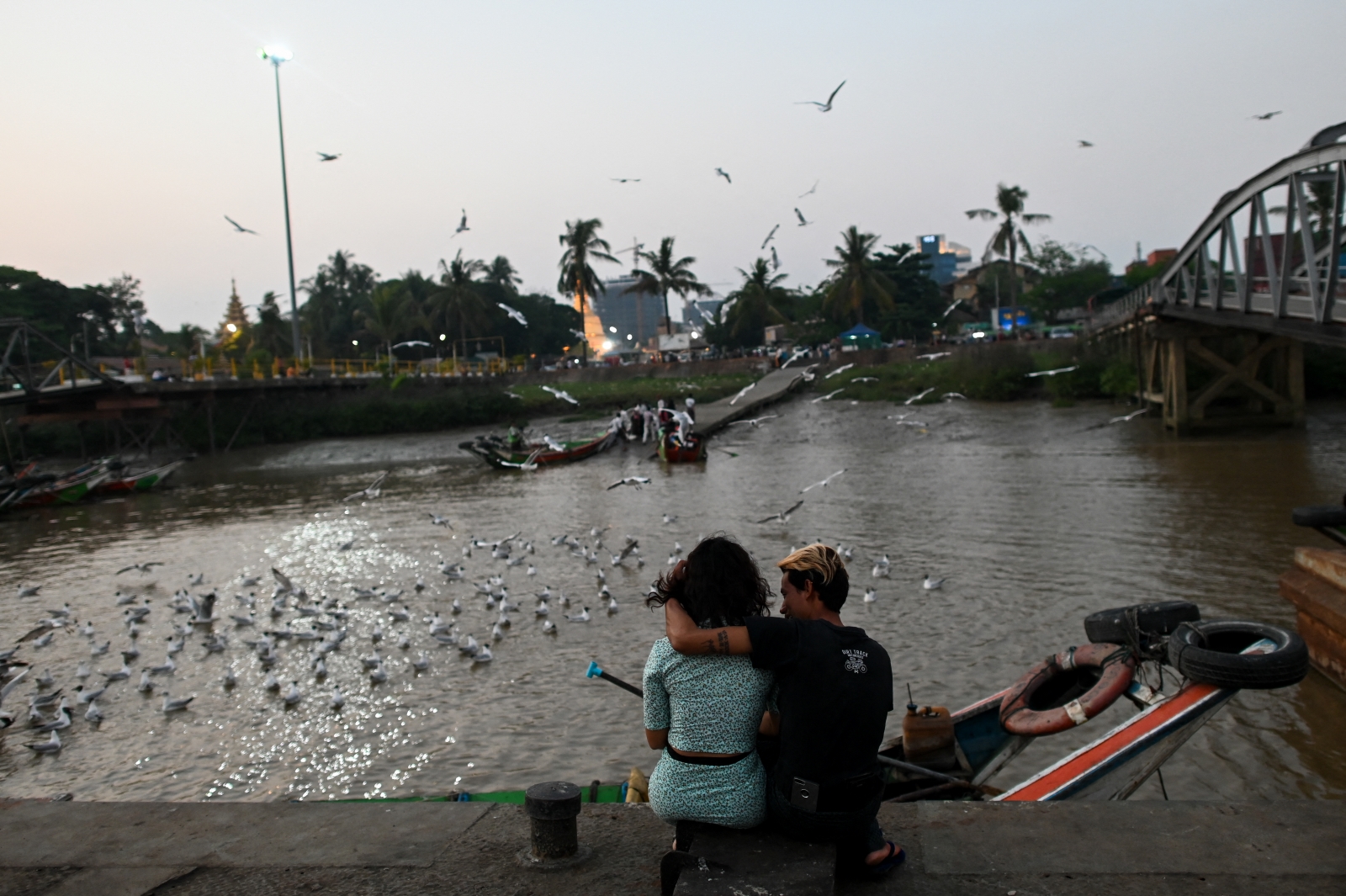Orphanages and charitable boarding houses are stretched to the limit taking in children displaced by conflict across Myanmar, as donations dry up and the regime cracks down on civil society.
By FRONTIER
Maung Khun Ye* has lived in an orphanage in a Nay Pyi Taw monastery since 2019. But as conflict has escalated across the country in the last year, the 16-year-old has noticed a surge of new children.
“Most of them are around five to six years old and are ready to start school. They come here for their education. I’m not really familiar with their family situations, but most of them are from ethnic regions,” said Khun Ye, who himself is Pa-O from Pinlaung Township in Shan State’s Pa-O Self-Administered Zone.
Dr Paul Peng Len, founder of the Immanuel Children’s Home in Yangon’s Hlegu Township, said there has been an increase in children coming to his centre since the recent “political changes”, referring to the 2021 military coup and subsequent armed conflict.
“Displaced children and those who have lost their parents increase during times of war,” he said.
According to the United Nations, more than 2.6 million people in Myanmar had been displaced by conflict by the end of last year, and approximately 18.6 million people – roughly one-third of the country’s population – were in need of humanitarian aid. They include six million children, many of whom have lost their homes and been deprived of healthcare, education and basic nutrition, the UN said.
But even as the need grows, the ability to support these children is dwindling.
Orphanages and boarding homes for disadvantaged children in Myanmar depend on donations and volunteers, but all five of the centres that spoke to Frontier said the economic and political situation since the coup has contributed to a decline in both forms of support.
Paul Peng Len said donations have decreased by about two-thirds, and blamed rising commodity prices and the “disintegration” of civil society organisations.
Since the coup, the regime has introduced new laws restricting and monitoring civil society groups, leading many to stop working entirely. “We heard back from people saying their groups no longer exist or that they don’t work for them anymore,” he said.
Ma Noe Noe, director of the New Generation orphanage in Yangon’s Shwepyithar Township, said the economic situation also discourages people from volunteering.
“Since they are volunteers, we can’t pay them a regular salary, so people with financial difficulties can’t do this work,” she said.
Naw Susanna Hla Hla Soe, minister for women and youth affairs for the National Unity Government, said the humanitarian crisis means there are many more people in need of support, even as there is less money to spare.
“It’s likely that donors are currently focusing more on internally displaced persons’ camps, border areas or ethnic regions,” she said.
The NUG is a parallel cabinet appointed by elected lawmakers deposed in the coup.
Ashin Khu Thala, a monk from the Yin Khwin Mae Orphanage in the town of Bago, 70 kilometres north of Yangon, said he’s gone as far as to sell his late parents’ home and farmland to continue funding the orphanage.
“We can’t just sit and be disheartened about the lack of donors,” he said.
‘We don’t have the room’
The limited funds mean orphanage directors are also having to make very difficult decisions about who to accept – and who to turn away.
Traditionally, many of the children sent to these centres are not actually orphans, including Khun Ye, but they come because their families can’t take care of them, or because they feel they can get a better education in a more stable area.
“The schools are open in my hometown, but I think my mum sent me here so that I can learn good discipline. I’m not entirely sure. I have regular contact with my mum. She said that although there is no fighting exactly where she lives, it’s happening in the surrounding areas,” Khun Ye said. “I miss my mum.”
Ma Noe Noe said her establishment is being pushed to its limits.
“Over the past one or two years, there has been a notable increase in the number of children needing assistance. Many of the children come from rural areas where the schools have closed and [the families] reach out to us to continue their education. However, we can only accommodate children in dire circumstances,” she said.
Ma Noe Noe said before the coup, they could accept children who weren’t really orphans but had a difficult home life, including parents who were invalids, neglectful or abusive.
“But now, we mainly just accept children who have no parents at all,” she said. “Some children contact us because the school is closed in their area and they want to go to school, but if their parents are still able to take care of them, we have to reject them. We explain our difficulties to them.”
Ashin Khu Thala said his centre also prioritises orphans, “especially children from remote ethnic areas facing difficulties”.
Paul Peng Len, meanwhile, said most of the new arrivals come from Rakhine State or Sagaing, Bago and Ayeyarwady regions. With the exception of Ayeyarwady, all have experienced severe conflict since the coup.
“Some parents wish for their children to stay here due to the instability in their region. However, sometimes we can’t accept them because we don’t have the room,” he said.

Reverse migration
Children leaving conflict-affected areas for orphanages and boarding homes in more stable areas is hardly new, but during the post-coup crisis, another trend has developed as well.
NUG minister Susanna Hla Hla Soe said there has also been an influx of students at schools controlled by ethnic armed groups.
Hundreds of thousands of civil servants went on strike rather than working for the military regime, and teachers at state schools were one of the largest groups to take this stand. Some children have followed suit by refusing to attend regime-controlled schools, while others live in areas where state-provided public services have largely collapsed.
Saw Thaw Thi, a spokesperson for the Karen Education and Culture Department of the Karen National Union, Myanmar’s oldest ethnic armed group, said the number of students at their schools increased by 30 percent after the coup.
“Some students come to our schools because they don’t want to go to public schools. Some students had to relocate because of fighting in their areas,” Thaw Thi said.
Thaw Thi said the department runs 1,233 schools, including 40 high schools. “Our policy is ‘education for all’ so we try our best to support all students,” he said, but admitted there’s now a shortfall of teachers and textbooks.
There are also security risks. “Our schools have to close if there are battles nearby,” Thaw Thi said, but it is harder to guard against aerial bombing. Multiple schools in territory controlled by resistance groups have been attacked with airstrikes, including one in Sagaing in 2022 that left at least 12 children dead, and another just this month in Kayah State that killed four children and two teachers.
Sending children to boarding houses in more stable areas is therefore preferred by many parents. Some of them simply help enrol the children at public schools in these areas, but others have their own education programmes. Ashin Khu Thala’s centre in Bago provides primary school education for its 120 children, while also offering vocational courses that include computer skills, language learning, tailoring, cooking and handicrafts.
Some of the orphanages say they get funds from the regime’s social welfare ministry, but the limited amounts mean they still rely on private donations. “The government’s support has not been discontinued but it’s only partial because they need to assist numerous organisations,” said Ma Noe Noe.
But others said they are denied this support because the regulations for registering orphanages are burdensome and prohibitive. Frontier was unable to reach the social welfare ministry for comment.
Susanna Hla Hla Soe said the NUG “holds a responsibility” to these organisations but admits its ability to support them is limited. “We are currently establishing tailoring classes for displaced women,” she said, referring to women sheltering in resistance-held territory. “However, our support doesn’t match the actual needs of the people in these areas.”
*indicates use of a pseudonym for security reasons







